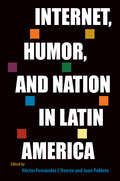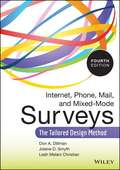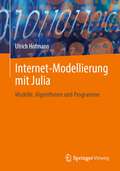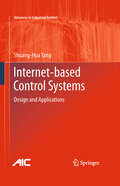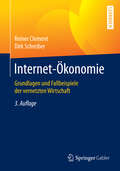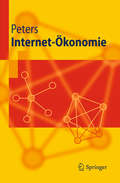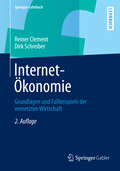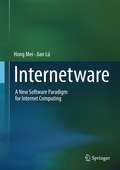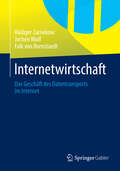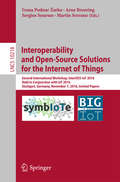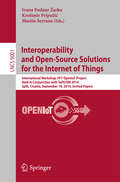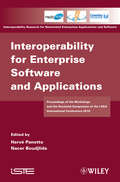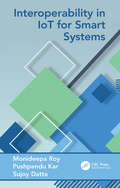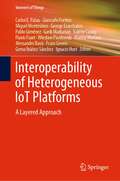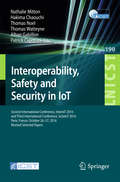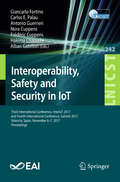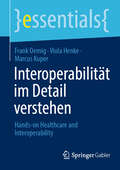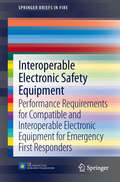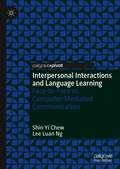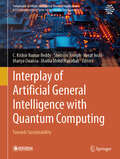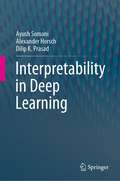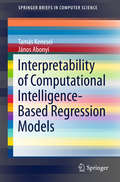- Table View
- List View
Internet, Humor, and Nation in Latin America (Reframing Media, Technology, and Culture in Latin/o America)
by Juan Poblete Héctor Fernández L’HoesteHow online humor influences politics and culture in Latin America This volume is the first to provide a comprehensive Latin American perspective on the role of humor in the Spanish- and Portuguese-language internet, highlighting how the production and circulation of online humor influence the region’s relation to democracy and civil society and the production of meaning in everyday life. Several case studies consider memes, including discussions of political cartoons in Mexico and imagery that portrays the mismanagement of natural disasters in Puerto Rico. Essays on Brazil examine how memes are shared on WhatsApp by Jair Bolsonaro supporters and how the Instagram account Barbie Fascionista offers memes as political commentary. Other case studies consider video content, including the sketches of Argentinian comedian Guillermo Aquino, the short-form material of Chilean vlogger Germán Garmendia, and a satirical YouTube column created by journalists in Colombia. Contributors also offer new methodologies for studying the laughable on social media, including a model for analyzing fake Twitter accounts. Internet, Humor, and Nation in Latin America demonstrates that internet humor can generate novel means of public interaction with the political and cultural spheres and create greater expectations of governmental accountability and democratic participation. This volume shows the importance of paying serious attention to humorous digital content as part of contemporary culture.Contributors: Eva Paulina Bueno | Juan Poblete | Alberto Centeno-Pulido | Damián Fraticelli | Juan Carlos Rodríguez | Viktor Chagas | Paul Alonso | Ulisses Sawczuk da Silva | Héctor Fernández L'Hoeste | Alejandra Nallely Collado Campos | R. Sánchez-Rivera | Mélodine Sommier | Fábio Marques de Souza A volume in the series Reframing Media, Technology, and Culture in Latin/o America, edited by Héctor Fernández L’Hoeste and Juan Carlos Rodríguez Publication of this work made possible by a Sustaining the Humanities through the American Rescue Plan grant from the National Endowment for the Humanities.
Internet, Phone, Mail, and Mixed-Mode Surveys: The Tailored Design Method (Fourth Edition)
by Don A. Dillman Leah Melani Christian Jolene D. SmythThe classic survey design reference, updated for the digital age For over two decades, Dillman's classic text on survey design has aided both students and professionals in effectively planning and conducting mail, telephone, and, more recently, Internet surveys. The new edition is thoroughly updated and revised, and covers all aspects of survey research. It features expanded coverage of mobile phones, tablets, and the use of do-it-yourself surveys, and Dillman's unique Tailored Design Method is also thoroughly explained. This invaluable resource is crucial for any researcher seeking to increase response rates and obtain high-quality feedback from survey questions. Consistent with current emphasis on the visual and aural, the new edition is complemented by copious examples within the text and accompanying website. This heavily revised Fourth Edition includes: Strategies and tactics for determining the needs of a given survey, how to design it, and how to effectively administer it How and when to use mail, telephone, and Internet surveys to maximum advantage Proven techniques to increase response rates Guidance on how to obtain high-quality feedback from mail,electronic, and other self-administered surveys Direction on how to construct effective questionnaires,including considerations of layout The effects of sponsorship on the response rates of surveys Use of capabilities provided by newly mass-used media:interactivity, presentation of aural and visual stimuli. The Fourth Edition reintroduces the telephone-including coordinating land and mobile. Grounded in the best research, the book offers practical how-to guidelines and detailed examples for practitioners and students alike.
Internet-Modellierung mit Julia: Modelle, Algorithmen und Programme
by Ulrich HofmannDas Buch verbindet die Internetmodellierung mit der neuen Programmiersprache Julia. Die Eignung von Julia für die Modellierung sowohl etablierter Internet-Modelle als auch für forschungsnahe Themen wie die Car-to-Infrastructure-Kommunikation und von Black-Box-Modellen für Lastprognosen mit neuronalen Netzen wird vermittelt. Nach dem Studium des Buches und den Anregungen für weitere selbständige Analysen ist der Leser in der Lage, auch komplexere Modellierungsaufgaben in Forschung und Entwicklung mit Julia zu bearbeiten.
Internet-based Control Systems
by Shuang-Hua YangThe Internet plays a significant and growing role in real-time industrial manufacturing, scheduling and management. A considerable research effort has led to the development of new technologies that make it possible to use the Internet for supervision and control of industrial processes. Internet-based Control Systems addresses the challenges that need to be overcome before the Internet can be beneficially used not only for monitoring of but also remote control industrial plants. New design issues such as requirement specification, architecture selection and user-interface design are dealt with. Irregular data transmission and data loss and, in extreme cases, whole-system instability may result from Internet time-delay; this book guards against such phenomena from both computer science and control engineering perspectives. Security breaches and safety risks in an Internet-based control system could have very serious consequences and the author gives specific advice for avoiding them. This book is unique in bringing together multiple strands of research, mainly from computer science and control engineering, into an over-arching study of the entire subject. Practical perspectives are explored both through case studies in several chapters and through real applications including: · robot arm control; · web-based simulator for a catalytic reactor; · virtual supervision parameter control of a water tank system; · model predictive control for a process control unit; · remote control performance monitoring and maintenance; · remote control system design and implementation; Internet-based Control Systems is a useful introduction and guide for researchers in control engineering and computer science and developers of real-time Internet-enabling software. It can also be used for teaching a final year option or elective on Internet-enabled real-time system design, or as an advanced example of real-time software design for graduates.
Internet-Ökonomie
by Dirk Schreiber Reiner ClementSeit Beginn der 1990er Jahre haben Informations- und Kommunikationstechnologien sowie das Internet einen tief greifenden Wandel hin zur Wissensgesellschaft ausgelöst. Wissen ist der einzige Produktionsfaktor, der sich durch Gebrauch vermehrt. Mit dem Web 2.0 werden innovative Formen der Interaktion zwischen Nutzern möglich. Aus diesem Wandel entstehen neue Fragestellungen: * Welche Regeln prägen die Internet-Ökonomie und worin unterscheiden sich diese von realen Märkten? * Wie lässt sich das für ökonomische Transaktionen wichtige Vertrauen schaffen? * Sind elektronische Märkte transparenter und werden Kunden mündiger? * Wie generieren Unternehmen auf elektronischen Märkten Wertschöpfung? * Werden elektronische Märkte von wenigen Unternehmen beherrscht? Das Buch führt den Leser in die Grundlagen der Internet-Ökonomie ein und erläutert anhand von praxisnahen Fallbeispielen und Übungsaufgaben ihre Funktionsweise. Lösungs- und Bearbeitungshinweise finden sich im Web.
Internet-Ökonomie
by Ralf PetersDas Internet als Eckpfeiler der modernen Informationsgesellschaft hat sowohl neue, digitale Märkte geschaffen als auch bestehende Märkte grundlegend verändert. Der Autor stellt die besonderen Merkmale der Internet-Ökonomie systematisch dar. Dazu wendet er klassische ökonomische Modelle auf das Internet an, stellt aber auch neue Modelle vor. Die Gesetzmäßigkeiten der Internet-Ökonomie werden anhand vieler Beispiele aufgedeckt, daraus der Erfolg etablierter Anbieter erklärt und Handlungsempfehlungen für Akteure der Internet-Ökonomie abgeleitet.
Internet-Ökonomie: Grundlagen und Fallbeispiele der vernetzten Wirtschaft
by Dirk Schreiber Reiner ClementInnovative Informations- und Kommunikationstechniken bzw. -technologien, das Internet und der Mobilfunk sind inzwischen fester und unverrückbarer Bestandteil unseres Alltags. Der noch vor Jahrzehnten beschriebene Strukturwandel zur Wissensgesellschaft ist Wirklichkeit. Das Web 2.0 verändert die Grundformen der ökonomischen Leistungserstellung und macht neue Arten der Interaktion zwischen Unternehmen und Kunden sowie der Nutzer untereinander möglich. Das Buch untersucht die Prinzipien der Internet-Ökonomie und die Auswirkungen des Internets für Grundformen der ökonomischen Leistungserstellung. Dazu zählen das Kaufen und Verkaufen auf elektronischen Märkten, das Tauschen, Teilen und die soziale Interaktion in sozialen Netzwerken. Das Buch entwickelt dazu einen systematischen und übergreifenden Ansatz. Eine Vielzahl von Fallbeispielen und Übungsaufgaben bieten einen hohen Anwendungsbezug. Die Lösungshinweise zu den Fallbeispielen und Übungsaufgaben sowie rund 300 Abb. sind als Download unter http://www.springer.com verfügbar.
Internet-Ökonomie: Grundlagen und Fallbeispiele der vernetzten Wirtschaft (Springer-Lehrbuch)
by Dirk Schreiber Reiner ClementInnovative Informations- und Kommunikationstechniken bzw. -technologien, das Internet und der Mobilfunk sind inzwischen fester und unverrückbarer Bestandteil unseres Alltags. Der noch vor Jahrzehnten beschriebene Strukturwandel zur Wissensgesellschaft ist Wirklichkeit. Das Web 2.0 verändert die Grundformen der ökonomischen Leistungserstellung und macht neue Arten der Interaktion zwischen Unternehmen und Kunden sowie der Nutzer untereinander möglich. Das Buch untersucht die Prinzipien der Internet-Ökonomie und die Auswirkungen des Internets für Grundformen der ökonomischen Leistungserstellung. Dazu zählen das Kaufen und Verkaufen auf elektronischen Märkten, das Tauschen, Teilen und die soziale Interaktion in sozialen Netzwerken. Das Buch entwickelt dazu einen systematischen und übergreifenden Ansatz. Eine Vielzahl von Fallbeispielen und Übungsaufgaben bieten einen hohen Anwendungsbezug. Die Lösungshinweise zu den Fallbeispielen und Übungsaufgaben sowie rund 300 Abb. sind als Download unter http://www.springer.com verfügbar.
Internetnutzung im häuslichen Alltag: Räumliche Arrangements zwischen Fragmentierung und Gemeinschaft (essentials)
by Jutta Röser Corinna PeilDer Beitrag präsentiert aktuelle Befunde zur Internetnutzung im häuslichen Alltag. Die Autorinnen nehmen zunächst eine Systematisierung alltagsbezogener Rezeptionsforschung der Cultural Studies vor und führen den Domestizierungsansatz ein. Auf Basis ethnografisch orientierter Haushaltsstudien wird anschließend aufgezeigt, auf welche Weise Internetnutzung, räumliche Arrangements und häusliche Kommunikationsstrukturen miteinander interagieren. Abschließend werden verschiedene Arrangements beschrieben und deren Einflüsse auf die Herstellung von Gemeinschaft und Fragmentierung, auf geschlechtsgebundene Praktiken sowie auf Funktionen anderer Medien, insbesondere des Fernsehens, skizziert.
Internets, Intranets, and Extranets: New Waves in Channel Surfing
by Audhesh PaswanGet the most from your electronic marketing resources! Internets, Intranets, and Extranets: New Waves in Channel Surfing examines cutting-edge research on the strategies and practices for managing electronic channels of information distribution. The leading experts working in Web-enabled marketing technologies address the most pressing topics of channel management, presenting descriptiveand prescriptiveinsights into the complex network of virtual links between people and places. This unique book looks at the death of distance from a global perspective, offering critical commentary on how to strengthen the connection between Web-linked buyers and sellers. Internets, Intranets, and Extranets presents a framework for working with e-business technologies that will help you develop electronic distribution strategies to maximize channel efficiency. The book addresses the signaling cues in marketing channels, examining the issues that affect the systemic flow of information, products, and services, including: the mediating role of channel structure on channel performance the transaction costs of cybermediaries the Internet's impact on independent sales agents the effects of brand familiarity and Web site vividness the analysis of electronic intermediaries in conventional distribution channels and the organizational and environmental factors involved in Internet-based marketing channels Internets, Intranets, and Extranets: New Waves in Channel Surfing is an essential resource for distribution managers, logisticians, and researchers interested in cutting-edge principles and practices in electronic distribution channels. The book is also an ideal supplement for academics working in electronic commerce study.
Internetware
by Hong Mei Jian LüThis book presents a comprehensive introduction to Internetware, covering aspects ranging from the fundamental principles and engineering methodologies to operational platforms, quality measurements and assurance and future directions. It also includes guidelines and numerous representative real-world case studies that serve as an invaluable reference resource for software engineers involved in the development of Internetware applications. Providing a detailed analysis of current trends in modern software engineering in the Internet, it offers an essential blueprint and an important contribution to the research on software engineering and systems for future Internet computing.
Internetwirtschaft
by Rüdiger Zarnekow Falk Von Bornstaedt Jochen WulfWährend der Aufbau und Betrieb von Internetinfrastrukturen zur Zeit der Entstehung des Internets in erster Linie von öffentlichen Institutionen vorangetrieben wurde, wird dieser Bereich heute längst von privatwirtschaftlichen Unternehmen beherrscht. Dieses Buch beschreibt Dienste, Wertschöpfungsprozesse und Wettbewerbsstrategien zur Erbringung des Datentransports im Internet aus betriebswirtschaftlicher Sicht. Es werden gleichermaßen Internetzugangsdienste zur Anbindung von Endkunden, Transitdienste zum Datenaustausch zwischen Netzbetreibern, Dienste zur Kapazitätsbereitstellung im Kernnetz und Dienste zur Distribution digitaler Inhalte und Anwendungen diskutiert. Durch die Darstellung der Teilmärkte, die den Datentransport im Internet adressieren, wird dem Leser ein umfassender Einblick in die Internetwirtschaft geboten, ohne dass hierzu ein tiefer gehendes technisches Verständnis vorausgesetzt wird. Darüber hinaus werden strategische Herausforderungen bei der Bereitstellung digitaler Inhalte und Anwendungen vorgestellt, die zukünftige Entwicklungen in der Internetwirtschaft maßgeblich beeinflussen.
Interoperability and Open-Source Solutions for the Internet of Things
by Ivana Podnar Žarko Martin Serrano Arne Broering Sergios SoursosThis book constitutes the thoroughly refereed post-conference proceedings of the International Workshop on Interoperability and Open-Source Solutions for the Internet of Things, FP7 OpenIot Project, held in Conjunction with SoftCOM 2014, in Split, Croatia, in September 2014. The 11 revised full papers presented together with the extended abstracts of 2 keynote talks were carefully reviewed and selected from numerous submissions during two rounds of reviewing and improvement. The papers are organized in topical sections on OpenIoT platform, open platforms and standards, and IoT Applications.
Interoperability and Open-Source Solutions for the Internet of Things
by Ivana Podnar Žarko Krešimir Pripužić Martin SerranoThis book constitutes the thoroughly refereed post-conference proceedings of the International Workshop on Interoperability and Open-Source Solutions for the Internet of Things, FP7 OpenIot Project, held in Conjunction with SoftCOM 2014, in Split, Croatia, in September 2014. The 11 revised full papers presented together with the extended abstracts of 2 keynote talks were carefully reviewed and selected from numerous submissions during two rounds of reviewing and improvement. The papers are organized in topical sections on OpenIoT platform, open platforms and standards, and IoT Applications.
Interoperability for Enterprise Software and Applications: Proceedings of the Workshops and the Doctorial Symposium of the I-ESA International Conference 2010
by Hervé Panetto Nacer BoudjlidaWithin the framework of the Sixth I-ESA International Conference, supported by the INTEROP VLab (International Virtual Laboratory on Enterprise Interoperability, http://www.interop-vlab.eu), three workshops and a Doctoral Symposium have been organized in order to strengthen some key topics related to interoperability for enterprise applications and software. The workshops were selected to complement the conference topics, leaving more time to researchers for brainstorming and then coming up, at the end of the workshops, with new research directions for the future. The goal of the workshop “Standards – a Foundation for Interoperability” is to increase awareness and understanding of interoperability standards as a fundamental need. The workshop “Use of MDI/SOA Concepts in Industry” promotes the application of MDI (Model-Driven Interoperability) combined with SOA (Services Oriented Architecture) and the associated technology (BPM, Enterprise Modeling, ontology, mediation, model transformation, etc.) in industry. The workshop on “Dynamic Management across Interoperating Enterprises” investigates the need for enhancements to current business management systems and processes to address the needs of global trading across enterprises utilizing the new service-oriented Internet. Finally, the Doctoral Symposium has given the opportunity for students involved in the preparation of their PhDs in this emerging area to present and discuss their research issues and ideas with senior researchers.
Interoperability in IoT for Smart Systems (Intelligent Systems)
by Monideepa Roy Pushpendu Kar Sujoy DattaInteroperability in IoT for Smart Systems discusses the different facets of interoperability issues among the IoT devices and their solutions, the scalability issues in an IoT network, and provides solutions for plug-n-play of new devices with the existing IoT system. It also addresses the possible usage of interoperable and plug-n-play IoT networks in different systems to make them smarter. Aimed at researchers and graduate students in computer science, computer engineering, computer networks, electronics engineering, this book Exclusively covers interoperability of IoT systems in parallel with their use towards the development of smart systems Discusses the requirements of interoperability in smart IoT systems and their solutions Reviews IoT applications in different smart and intelligent systems Explores dealing with interoperability of heterogeneous participating devices Provides different case studies and open problems related to interoperability in IoT systems
Interoperability of Heterogeneous IoT Platforms: A Layered Approach (Internet of Things)
by Giancarlo Fortino George Exarchakos Alessandro Bassi Garik Markarian Carlos E. Palau Wiesław Pawłowski Miguel Montesinos Pablo Giménez Valérie Castay Flavio Fuart Marina Mortara Frans Gevers Gema Ibáñez-Sánchez Ignacio HuetThis book discusses the design and implementation of, as well as experimentation on, an open cross-layer framework and associated methodology to provide voluntary interoperability among heterogeneous Internet of Things (IoT) platforms. It allows readers to effectively and efficiently develop smart IoT applications for various heterogeneous IoT platforms, spanning single and/or multiple application domains. To do so, it provides an interoperable framework architecture for the seamless integration of different IoT architectures present in different application domains. In this regard, interoperability is pursued at various levels: device, network, middleware, services and data.
Interoperability, Safety and Security in IoT
by Hakima Chaouchi Alban Gabillon Nathalie Mitton Thomas Noel Thomas Watteyne Patrick CapolsiniThis book constitutes the refereed post-conference proceedings of the International Conference on Safety and Security in Internet of Things , SaSeIoT 2016, which was collocated with InterIoT and took place in Paris, France, in October 2016. The 14 revised full papers were carefully reviewed and selected from 22 submissions and cover all aspects of the latest research findings in the area of Internet of Things (IoT).
Interoperability, Safety and Security in IoT: Third International Conference, InterIoT 2017, and Fourth International Conference, SaSeIot 2017, Valencia, Spain, November 6-7, 2017, Proceedings (Lecture Notes of the Institute for Computer Sciences, Social Informatics and Telecommunications Engineering #242)
by Hakima Chaouchi Frédéric Cuppens Antonio Guerrieri Giancarlo Fortino Alban Gabillon Nora Cuppens Carlos E. PalauThis book constitutes the refereed post-conference proceedings of the Third International Conference on Interoperability, InterIoT 2017, which was collocated with SaSeIoT 2017, and took place in Valencia, Spain, in November 2017. The 14 revised full papers were carefully reviewed and selected from 22 submissions and cover all aspects of the latest research findings in the area of Internet of Things (IoT).
Interoperabilität im Detail verstehen: Hands-on Healthcare & Interoperability (essentials)
by Frank Oemig Viola Henke Marcus KuperDieses essential bietet einen Einstieg in die Fragestellung, was mit dem Begriff „Interoperabilität“ gemeint ist, der nicht nur den Datenaustausch zwischen IT-Systemen im Gesundheitswesen beschreibt. Dazu werden die in diesem Kontext häufig gebrauchten Begriffe wie Kompatibilität oder Konformität erläutert und in einen Zusammenhang gebracht. Weiterhin wird aufgezeigt, dass Interoperabilität das Ergebnis eines längeren Arbeits- und Austauschprozesses ist und wie „Interoperabilität“ für den erfolgreichen und reibungslosen Einsatz im Gesundheitssystem gemeinsam mit allen Stakeholdern weiterentwickelt werden kann.
Interoperable Electronic Safety Equipment: Performance Requirements for Compatible and Interoperable Electronic Equipment for Emergency First Responders
by Casey C GrantFirefighters and other emergency first responders use a huge variety of highly specialized and critical technologies for personal protection. These technologies, ranging from GPS to environmental sensing to communication devices, often run on different systems with separate power supplies and operating platforms. How these technological components function in a single synergistic system is of critical interest to firefighter end-users seeking efficient tools. Interoperable ESE states that a standardized platform for electronic safety equipment (ESE) is both logical and essential. This book develops an inventory of existing and emerging electronic equipment categorized by key areas of interest to the fire service, documents equipment performance requirements relevant to interoperability, including communications and power requirements, and develops an action plan toward the development of requirements to meet the needs of emergency responders. This book is intended for practitioners as a tool for understanding interoperability concepts and the requirements of the fire service landscape. It offers clear recommendations for the future to help ensure efficiency and safety with fire protection equipment. Researchers working in a related field will also find the book valuable.
Interpersonal Interactions and Language Learning: Face-to-Face vs. Computer-Mediated Communication
by Shin Yi Chew Lee Luan NgThis book takes as its starting point the assumption that interpersonal communication is a crucial aspect of successful language learning. Following an examination of different communicative models, the authors focus on traditional face-to-face (F2F) interactions, before going on to compare these with the forms of computer-mediated communication (CMC) enabled by recent developments in educational technology. They also address the question of individual differences, particularly learners' preferred participation styles, and explore how F2F and CMC formats might impact learners differently. This book will be of interest to students and scholars of computer-mediated communication (CMC), computer-assisted language learning (CALL), technology-enhanced language learning (TELL), language acquisition and language education more broadly.
Interplay of Artificial General Intelligence with Quantum Computing: Towards Sustainability (Sustainable Artificial Intelligence-Powered Applications)
by Mariya Ouaissa Marlia Mohd Hanafiah C. Kishor Kumar Reddy Shenson Joseph Herat JoshiThis book investigates the dynamic relationship between artificial general intelligence (AGI) and quantum computing. AGI refers to a form of AI capable of performing any intellectual task that a human can, while quantum computing utilizes quantum mechanics principles to process information in fundamentally different ways compared to classical computing. This interplay explores how quantum computing might enhance AGI by accelerating complex computations and optimizing learning algorithms, potentially enabling AGI systems to solve problems beyond the reach of traditional computers. It also examines the challenges and opportunities presented by combining these technologies, including theoretical implications and practical applications in advancing AI capabilities. This book examines the groundbreaking intersection of artificial general intelligence (AGI) and quantum computing. The book explores how AGI, which aims to replicate human-like cognitive abilities, can be enhanced by quantum computing's unique processing capabilities. It delves into theoretical foundations, practical applications, and potential synergies, illustrating how quantum computing could tackle complex computational challenges inherent in AGI development. By integrating these advanced technologies, the book provides a comprehensive analysis of their combined impact, offering insights into future advancements and the transformative potential of merging AGI with quantum computing.
Interpretability in Deep Learning
by Alexander Horsch Ayush Somani Dilip K. PrasadThis book is a comprehensive curation, exposition and illustrative discussion of recent research tools for interpretability of deep learning models, with a focus on neural network architectures. In addition, it includes several case studies from application-oriented articles in the fields of computer vision, optics and machine learning related topic. The book can be used as a monograph on interpretability in deep learning covering the most recent topics as well as a textbook for graduate students. Scientists with research, development and application responsibilities benefit from its systematic exposition.
Interpretability of Computational Intelligence-Based Regression Models
by Tamás Kenesei János AbonyiThe key idea of this book is that hinging hyperplanes, neural networks and support vector machines can be transformed into fuzzy models, and interpretability of the resulting rule-based systems can be ensured by special model reduction and visualization techniques. The first part of the book deals with the identification of hinging hyperplane-based regression trees. The next part deals with the validation, visualization and structural reduction of neural networks based on the transformation of the hidden layer of the network into an additive fuzzy rule base system. Finally, based on the analogy of support vector regression and fuzzy models, a three-step model reduction algorithm is proposed to get interpretable fuzzy regression models on the basis of support vector regression. The authors demonstrate real-world use of the algorithms with examples taken from process engineering, and they support the text with downloadable Matlab code. The book is suitable for researchers, graduate students and practitioners in the areas of computational intelligence and machine learning.
